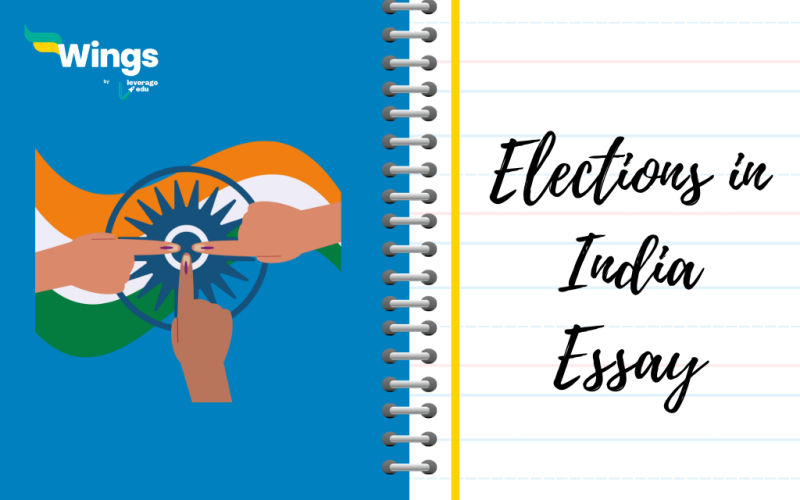Essay on Elections in India: PM Modi, during the Lok Sadha session, said,’ said on April 27, 2024 “We do not have government by the majority… but by the majority who participate.” Elections in India, the world’s largest democracy, are a testament to the vibrancy and diversity of its political landscape. Conducted on a massive scale, they involve millions of voters, numerous political parties, and rigorous oversight by various institutions. This essay will delve into the key aspects of elections in India, including the conducting body, the role of election development, and concluding insights.
Quick Read: Essay on the Role of Youth in Nation-Building
Table of Contents
Essay on Elections in India in 500 Words
Elections in India are like a season where political parties, the election commission, government officials, bureaucrats, and people of India, aged 18 and above, cast their votes and actively participate in the election process. India’s democratic system largely relies on elections and its people’s active participation. Elections in India are conducted at multiple levels, such as Lok Sabha, Vidhan Sabha, and local bodies, which include municipalities and gram sabhas.
Elections Conducting Body
The Election Commission of India (ECI) is the apex body responsible for overseeing the conduct of elections in India at all levels. Established in 1950, Sukumar Sen was the first election commissioner of India. The ECI operates as an autonomous constitutional authority. Its primary functions include delimitation of constituencies, voter registration, issuing electoral guidelines, conducting polls, and enforcing the electoral code of conduct.
Importance of Election in India
Elections in India represent a cornerstone of its democratic ethos, enabling citizens to exercise their fundamental right to choose their representatives. The Election Commission of India, as the apex conducting body, plays a pivotal role in ensuring the conduct of free, fair, and transparent elections. Moreover, ongoing efforts in election development are essential to bolster democratic principles, foster inclusivity, and uphold the sanctity of the electoral process.
1. Democratic representation: Elections in India offer citizens the chance to choose representatives, fostering democratic accountability and governance.
2. Political stability: Regular elections ensure stability via peaceful power transfer and governance continuity.
3. Participation and empowerment: Elections empower citizens, fostering voice, participation, belonging, and national responsibility.
4. Policy direction: Election outcomes shape policy through party manifestos, reflecting the electorate’s will.
5. Accountability: Elections ensure leaders face scrutiny, as voters decide re-election based on performance, fostering accountability.
6. Social inclusion: Elections promote inclusivity by giving marginalised communities a platform to assert their rights and interests, leading to more equitable representation in governance.
7. Legitimacy of government: Free and fair elections enhance the legitimacy of the government and its actions, ensuring that the authority to govern is derived from the consent of the governed.
8. Peaceful resolution of conflicts: Elections provide a peaceful mechanism for resolving political disputes and grievances, reducing the likelihood of violence and promoting social cohesion.
Quick Read: Essay on Voting Rights in India: 500 Words in English for Students
Conclusion
As India continues to evolve as a vibrant democracy, it must remain committed to strengthening its electoral institutions, enhancing voter participation, and safeguarding the integrity of its electoral processes. Through concerted efforts in election management and development, India can further consolidate its democratic foundations and serve as a beacon of democratic governance for the world.
Paragraph on One Nation, One Election
| “One Nation, One Election” proposes synchronising all elections to the Lok Sabha, state legislative assemblies, and local bodies across India. Advocates argue it reduces electoral expenditure, and bureaucratic burden, and ensures governance continuity. Critics highlight challenges such as constitutional amendments, logistical complexities, and dilution of federalism. Achieving consensus among political parties and states remains a formidable task. Nonetheless, proponents view it as a means to streamline governance and focus on developmental agendas. Implementing this ambitious concept necessitates meticulous planning, political will, and thorough deliberation to uphold democratic values and institutional integrity. |
FAQs
A.1 Democracy means rule by the people. There are different ways this can be done: People meet to decide about new laws and changes to existing ones. This is usually called direct democracy. It is never used except in small countries, or perhaps in towns.
A.2 The voters who live in an area elect one representative. For Lok Sabha elections, India is divided into 543 constituencies. The representative elected from each constituency is called a Member of Parliament or an MP.
A.3 There are different ways of organising a democratic society and as a result, there are different types of democracies. The two types of democracy in practice around the world are direct democracy and representative democracy.
Popular Essay Topics
For more information on such interesting topics, visit our essay writing page and follow Leverage Edu.
 One app for all your study abroad needs
One app for all your study abroad needs













